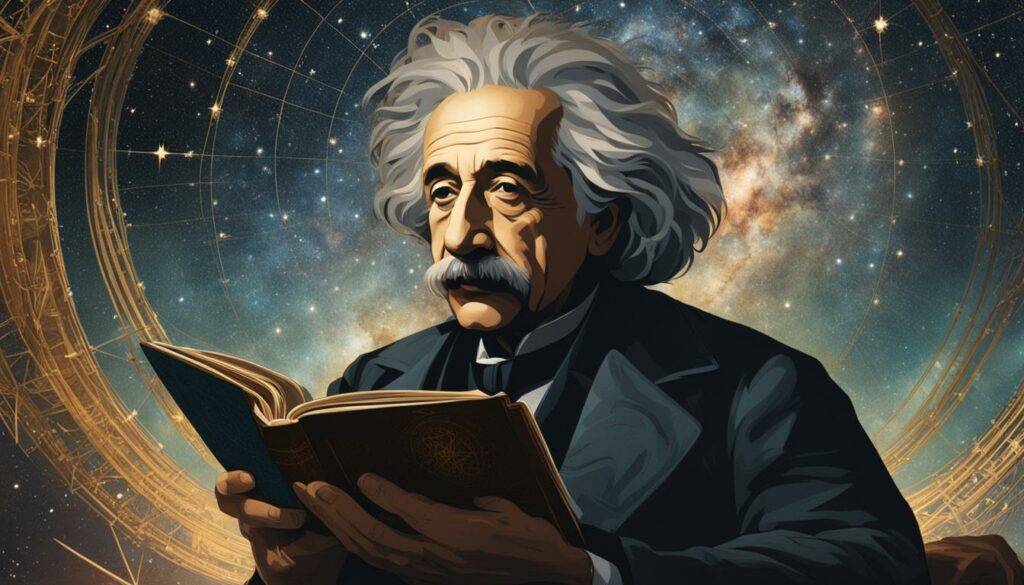Albert Einstein, one of the greatest scientists in history, had a unique perspective on the concept of God that was influenced by the philosophy of Spinoza. In this article, we delve into Einstein’s views on the correlation between philosophy, science, and religion, and how they challenge traditional notions of a personal deity.
Key Takeaways:
- Einstein believed in a pantheistic view of God, where God is synonymous with the universe and its laws.
- Spinoza’s philosophy influenced Einstein’s thinking, particularly his belief that the universe and God are one and the same.
- Einstein saw science and religion as complementary approaches to understanding the nature of reality.
- He emphasized the importance of critical thinking, imagination, and empathy in both scientific and philosophical exploration.
- Einstein’s views on morality and ethics emphasized the value of living for others and embracing diversity.
The Influence of Spinoza’s Philosophy on Einstein’s Beliefs
Einstein’s statement about believing in Spinoza’s God indicates the profound influence that the 17th-century philosopher Baruch Spinoza had on his thinking. Spinoza’s philosophy proposed a pantheistic view of God, which posits that God and the universe are one and the same. This concept resonated with Einstein and shaped his own belief system, influencing his understanding of the nature of God and the interconnectedness of all things.
Einstein saw the universe as a unified entity governed by laws, and he sought to unravel these principles to gain a deeper understanding of the nature of God. This aligns with Spinoza’s philosophy, which emphasized the rational exploration of the world. By embracing Spinoza’s ideas, Einstein was able to challenge traditional religious notions of a personal deity and develop a unique perspective that blended science, philosophy, and religion.
| Spinoza’s Philosophy | Einstein’s Beliefs |
|---|---|
| God and the universe are one | Belief in a pantheistic God |
| Rational exploration of the world | Seeking to understand the laws that govern the universe |
| Emphasis on reason and rationality | Importance of critical thinking and skepticism |
| Challenging traditional religious notions | Rejection of a personal God |
“I believe in Spinoza’s God, who reveals himself in the lawful harmony of the world, not in a God who concerns himself with the fate and doings of mankind.” – Albert Einstein
The influence of Spinoza’s philosophy on Einstein’s beliefs can be seen in the way he approached the relationship between science, philosophy, and religion. By embracing Spinoza’s pantheistic view of God, Einstein developed a unique perspective that challenged traditional religious notions while seeking to understand the underlying principles that govern the universe. This synthesis of science and philosophy allowed Einstein to explore the mysteries of the universe and contemplate the nature of God in a way that was both rational and awe-inspiring.
The Relationship Between God and Science in Einstein’s View
Einstein’s perspective on God was deeply intertwined with his scientific approach. He saw the study of science as a means of understanding the intricacies of the universe and the laws that govern it. In his view, God could be found in the very fabric of reality, which is shaped by these laws. He believed that science and religion were not incompatible but rather two different ways of approaching the same truth. While science seeks to explain the how and what of the universe, religion delves into the why and meaning behind it all. Einstein saw a harmony between scientific exploration and spiritual contemplation, both leading to a deeper understanding of the nature of God and existence.
Einstein’s belief in the scientific approach to God challenged traditional religious notions of a personal deity who intervenes in human affairs. He rejected the idea of a God who concerns himself with the fate and actions of humanity. Instead, he saw God as the underlying order and harmony of the universe, revealed through the laws of nature. This perspective aligned with his pantheistic view, where God is synonymous with the universe itself.
Through his scientific pursuits, Einstein sought to unravel the mysteries of the universe and uncover the fundamental principles that govern it. He believed that by understanding these principles, one could come closer to understanding the nature of God. For Einstein, the pursuit of scientific knowledge was not separate from the pursuit of spiritual understanding. Rather, both were interconnected paths leading to a more profound comprehension of the cosmos and the divine.
Einstein’s Rejection of a Personal God
In his exploration of the concept of God, Albert Einstein rejected the traditional notion of a personal deity actively involved in human affairs. Instead, he embraced a more abstract and impersonal understanding of God. Einstein believed that the idea of a personal God who concerns himself with the fate and actions of humanity was a projection of human desires and fears onto the concept of God. He saw God as the underlying order and harmony of the universe, revealed through the laws of nature.
“I believe in Spinoza’s God, who reveals himself in the lawful harmony of the world, not in a God who concerns himself with the fate and doings of mankind.”
– Albert Einstein
Einstein’s rejection of a personal God was rooted in his scientific and rational approach to understanding the world. He saw the study of science as a means of uncovering the intricate laws that govern the universe. Through his scientific endeavors, Einstein sought to unravel the mysteries of the universe and gain a deeper understanding of the nature of reality. This perspective led him to view God as synonymous with the laws and order that govern the universe, rather than an anthropomorphic being.
By rejecting a personal God, Einstein challenged traditional religious views and opened up new possibilities for exploring the relationship between science, philosophy, and religion. His beliefs contributed to a broader conversation about the nature of God and the interconnectedness of all things in the universe.

| Traditional View of God | Einstein’s View of God |
|---|---|
| Personal deity | Abstract and impersonal force |
| Actively involved in human affairs | Revealed through the laws of nature |
| Concerned with the fate and actions of humanity | Underlying order and harmony of the universe |
The Importance of Critical Thinking and Skepticism
In Albert Einstein’s philosophy, critical thinking and skepticism played pivotal roles in his approach to understanding the world. He believed that questioning assumptions and challenging authority were essential for intellectual growth and the pursuit of truth. Einstein’s emphasis on critical thinking aligned with his belief in the power of reason and rationality in unraveling the mysteries of the universe.
Einstein urged individuals to think for themselves, not blindly accepting established ideas or traditions. He advocated for a skeptical mindset that questioned everything, including one’s own beliefs, in order to uncover deeper truths. By challenging authority and conventional wisdom, Einstein believed that individuals could break free from the limitations imposed by societal norms and open up new realms of knowledge and understanding.
In Einstein’s view, critical thinking was not just about acquiring knowledge but also about developing the ability to think independently and analyze information objectively. He believed that this skill was essential for navigating the complexities of life and making informed decisions.
Einstein on Skepticism:
“The important thing is not to stop questioning. Curiosity has its own reason for existence. One cannot help but be in awe when he contemplates the mysteries of eternity, of life, of the marvelous structure of reality. It is enough if one tries merely to comprehend a little of this mystery each day.”
Einstein’s quote highlights his belief in the value of curiosity and the continual pursuit of knowledge. He encouraged individuals to maintain a sense of wonder and curiosity throughout their lives, embracing new ideas and perspectives. By thinking critically and skeptically, Einstein believed that individuals could unlock the hidden truths of the universe and deepen their understanding of the nature of reality.

The Importance of Critical Thinking:
| Benefits of Critical Thinking | Examples |
|---|---|
| Enhanced problem-solving skills | Applying logical reasoning to identify solutions |
| Improved decision-making | Evaluating evidence and weighing pros and cons |
| Reduced susceptibility to manipulation | Questioning motives and verifying information |
| Open-mindedness and tolerance | Considering diverse perspectives and challenging biases |
Table: The benefits of critical thinking. Critical thinking equips individuals with valuable skills that can enhance problem-solving, decision-making, and the ability to navigate complex situations. By questioning assumptions and challenging authority, critical thinkers can cultivate open-mindedness and develop a deeper understanding of the world.
In summary, Albert Einstein’s philosophy emphasized the importance of critical thinking and skepticism in understanding the world. He believed that questioning assumptions, challenging authority, and thinking independently were essential for intellectual growth and the pursuit of truth. Critical thinking not only enhances problem-solving and decision-making skills but also cultivates open-mindedness and tolerance. By embracing a skeptical mindset and continuously questioning, individuals can unlock hidden truths and uncover the mysteries of the universe.
The Significance of Imagination and Intuition
Einstein recognized the profound significance of imagination and intuition in both scientific and philosophical exploration. He understood that these faculties played a vital role in pushing the boundaries of human knowledge and uncovering the mysteries of the universe.
Imagination, in particular, allowed scientists to transcend the limitations of what is known and explore new possibilities. It was through the power of imagination that Einstein conceived of his groundbreaking theories and made revolutionary discoveries. He believed that imagination was the key to unlocking new realms of understanding and expanding our collective knowledge.
Similarly, Einstein valued intuition, which he described as a deep sense of knowing without being able to articulate why. He believed that intuition was essential in guiding scientific inquiry, allowing scientists to make intuitive leaps and connect seemingly unrelated ideas. Intuition, for Einstein, was a tool for tapping into a higher level of consciousness and accessing profound insights that surpassed the realm of logical reasoning.
“Imagination is more important than knowledge. For knowledge is limited to all we now know and understand, while imagination embraces the entire world, stimulating progress, giving birth to evolution.” – Albert Einstein
Einstein’s emphasis on imagination and intuition reflects his belief in the power of curiosity and wonder in driving scientific and philosophical discovery. He believed that maintaining a childlike curiosity for life and embracing the unknown were essential in unraveling the secrets of the universe. Through imagination and intuition, Einstein sought to push the boundaries of human understanding and inspire future generations to explore the vast mysteries of the cosmos.
The Significance of Einstein’s Views on Morality and Ethics
Einstein’s beliefs about the nature of God and the universe were intimately tied to his understanding of morality and ethics. For Einstein, true fulfillment and meaning in life came from living for others rather than pursuing personal gain. He saw ethics as being rooted in empathy, compassion, and a sense of responsibility towards fellow human beings. Einstein’s perspective aligned with many religious teachings that emphasize the value of service to others and the interconnectedness of all beings.
Living for others was an integral part of Einstein’s philosophy. He believed that a life dedicated to benefiting others was a life truly worthwhile and meaningful. In his view, selfish desires and material pursuits were secondary to the pursuit of moral values and the well-being of humanity as a whole.
Einstein’s emphasis on morality and ethics reflected his deep understanding of the importance of empathy and compassion in human behavior. He believed that these qualities were essential for fostering harmony and cooperation among individuals and communities. By living ethically and treating others with kindness and respect, Einstein believed that humanity could create a better world and ensure the well-being of future generations.
| Einstein’s Views on Morality and Ethics | Key Points |
|---|---|
| 1. Living for Others | Einstein emphasized the importance of dedicating one’s life to benefiting others rather than pursuing personal gain. |
| 2. Empathy and Compassion | Einstein believed that empathy and compassion were essential for fostering harmony and cooperation among individuals and communities. |
| 3. Moral Values | Einstein saw ethics as being grounded in a sense of responsibility towards fellow human beings and the pursuit of moral values. |
| 4. Creating a Better World | Einstein believed that by living ethically and treating others with kindness and respect, humanity could create a more harmonious and just world. |
The Limitations of Human Understanding
Albert Einstein recognized that despite all our scientific and philosophical endeavors, there are inherent limitations to human understanding. He understood that our knowledge and comprehension of the universe is constantly evolving, and there will always be mysteries that elude us. In his words, “The most beautiful thing we can experience is the mysterious. It is the source of all true art and science.”
Einstein emphasized the interconnectedness of humanity, comparing our diverse beliefs, religions, arts, and sciences to branches of the same tree. He believed that we should embrace this diversity, as it enriches our collective understanding. Einstein urged individuals not to have lukewarm attitudes in life but to cultivate a genuine curiosity and thirst for knowledge. He saw intellectual and personal growth as a continuous journey of self-discovery and transformation.
“We are all branches of the same tree; our thoughts are a continuation of the thoughts of our ancestors, and our actions affect the future generations. Let us not be satisfied with lukewarm attitudes in life, but strive for the pursuit of truth and justice with character and courage.”
The Complexity of the Universe
While Einstein believed in the power of human reason and rationality, he acknowledged that our understanding of the universe is limited. He recognized the vastness and complexity of the cosmos, and our ability to comprehend it is only a fraction of its true nature. Einstein called for humility in the face of this vastness, urging individuals to free themselves from the constraints of their own minds. He believed that by expanding our perspectives and questioning our own assumptions, we can unlock new realms of knowledge and understanding.
Embracing the Unknown
Einstein championed the value of imagination and intuition in both scientific and philosophical pursuits. He encouraged individuals to tap into their innate creativity and wonder, allowing them to explore the unknown and discover new truths. Einstein believed that our childlike curiosity should never be extinguished but nurtured throughout our lives. He saw the pursuit of knowledge and understanding as a pathway to unlocking the mysteries of the universe and finding deeper meaning and purpose in our existence.
| The Limitations of Human Understanding | |
|---|---|
| We are all branches of the same tree | Our thoughts are a continuation of the thoughts of our ancestors, and our actions affect future generations |
| Don’t have lukewarm attitudes in life | Strive for the pursuit of truth and justice with character and courage |
The Role of Science and Philosophy in Exploring Truth
Science and philosophy are two powerful and complementary tools that we as humans have at our disposal to explore the mysteries of the universe and seek a deeper understanding of truth. Both disciplines offer unique perspectives and methodologies that allow us to approach the fundamental questions of existence from different angles. Science, with its empirical observations and rigorous experimentation, helps us unravel the laws and mechanisms that govern the physical world. Philosophy, on the other hand, encourages us to engage in critical thinking and contemplation, delving into the nature of reality, consciousness, and the complexities of human experience.
While science focuses on unraveling the “how” of the universe, philosophy delves into the “why” and seeks to uncover the meaning and purpose behind it all. In this sense, science and philosophy are like two sides of the same coin, working together to shed light on the nature of reality. Science provides us with tangible evidence and measurable data, while philosophy encourages us to question assumptions, challenge established beliefs, and explore the realms of abstract thought.
It is through the integration of science and philosophy that we can gain a more holistic understanding of the world around us. They both have their strengths and limitations, and together they offer a more comprehensive perspective. Science helps us uncover the physical laws that govern the universe, but it cannot answer questions about the ultimate purpose or meaning of life. Philosophy, on the other hand, helps us examine the deeper questions of existence, but it relies on reasoning and logic rather than empirical evidence.
The Interconnectedness of Science and Philosophy
Science and philosophy are not separate or conflicting disciplines but rather interconnected and mutually enriching fields of inquiry. The pursuit of scientific knowledge often raises profound philosophical questions, while philosophical investigations can inform and shape the direction of scientific research. For example, the field of quantum physics has not only revolutionized our understanding of the physical world but also challenged long-held philosophical assumptions about determinism and causality.
Similarly, ethical debates surrounding scientific advancements, such as genetic engineering or artificial intelligence, require philosophical reflection on the implications and ethical considerations of these technologies. The integration of science and philosophy allows us to engage in a more nuanced and comprehensive exploration of truth, bridging the gap between empirical evidence and abstract thought.
| Science | Philosophy |
|---|---|
| Empirical observations | Abstract reasoning |
| Investigates the physical world | Explores the nature of reality and consciousness |
| Relies on data and experimentation | Challenges assumptions and examines fundamental questions |
| Answers the “how” of the universe | Explores the “why” and seeks meaning and purpose |
Together, science and philosophy offer us the tools to embark on a journey of exploration, deepening our understanding of the world and our place within it. The integration of these disciplines allows us to approach truth from multiple perspectives, fostering critical thinking, intellectual curiosity, and a deeper appreciation for the wonders of the universe.
The Pursuit of Wisdom and Humility
Einstein’s philosophy is rooted in the pursuit of wisdom and humility. He recognized that knowledge and understanding are ever-evolving, and it is essential to constantly challenge our thoughts and thinking. Einstein believed in the power of change and growth, urging individuals to unlock the prison gate of their own minds and embrace new ideas and perspectives.
Wisdom, according to Einstein, is not just about acquiring knowledge but also about the ability to think critically and question assumptions. It involves being open to different viewpoints and being willing to reevaluate our own ideas when confronted with new evidence or insights. By constantly challenging our thinking and seeking the truth, we can expand our understanding of the world and ourselves.
“Insanity is doing the same thing over and over again and expecting different results.”
This famous quote by Einstein encapsulates the importance of change and the need to break free from stagnant patterns of thought. He believed that true wisdom lies in embracing the unknown with humility and a willingness to learn from others. By recognizing the limitations of our understanding, we can remain open-minded and continue to grow intellectually and spiritually.
Einstein’s philosophy serves as a reminder that the pursuit of wisdom and humility is a lifelong journey. It requires us to challenge our own beliefs and be receptive to new ideas, always seeking the truth and striving for personal and intellectual growth.
Table: The Importance of Change and Humility
| Benefits of Change and Humility | Examples |
|---|---|
| Intellectual Growth | Embracing new ideas and perspectives broadens our understanding of the world. |
| Personal Development | Challenging our thoughts and thinking allows us to grow intellectually and spiritually. |
| Open-mindedness | Being receptive to new ideas fosters empathy, understanding, and respect for others. |
| Critical Thinking | Questioning our own beliefs and assumptions enhances our ability to think critically and analyze information. |
The Call for Inner Transformation and Compassion
In his philosophical exploration of the nature of God and the universe, Albert Einstein emphasized the importance of simplicity and everyday thinking. He believed that true understanding and wisdom could be found in the straightforward and uncomplicated approach to life and knowledge. Einstein saw the pursuit of knowledge as a means of unlocking the prison gate of limited thinking and expanding one’s understanding of the world.
Einstein’s call for simplicity resonates with the idea that the most profound truths are often found in the simplest concepts. By stripping away the complexities and distractions of everyday life, we can gain clarity and insight into the interconnectedness of all things. Everyday thinking, in Einstein’s view, is a way of approaching life with a childlike curiosity and wonder, maintaining a sense of awe and appreciation for the mysteries of the universe.
“The definition of genius is taking the complex and making it simple.” – Albert Einstein
Einstein’s philosophy also emphasizes the need for compassion as a guiding principle in our interactions with others. He believed that true fulfillment and meaning in life came from living for the well-being of humanity, rather than pursuing selfish desires. Compassion, in Einstein’s view, is an acknowledgment of our interconnectedness and a recognition of the inherent value and dignity of every individual.
By embracing simplicity, everyday thinking, and compassion, we can embark on a journey of inner transformation and cultivate a more meaningful and fulfilling life. Einstein’s philosophy offers a profound perspective on the importance of approaching life and knowledge with humility, curiosity, and a genuine concern for the well-being of others.
Conclusion
Albert Einstein’s philosophy on the concept of God, influenced by the ideas of Spinoza, presents a fascinating perspective on the interplay between science, philosophy, and religion. By believing in a pantheistic God, Einstein challenged conventional notions of a personal deity and embraced the idea that God can be found in the harmonious order of the universe.
Einstein saw science and religion as complementary approaches to understanding the nature of reality. He believed that critical thinking, imagination, and empathy were essential in this pursuit. By emphasizing the interconnectedness of all beings and the importance of wisdom and compassion, Einstein called for a deeper exploration of meaning and purpose in life.
Throughout his philosophy, Einstein recognized the limitations of human understanding and encouraged individuals to remain open to new ideas and perspectives. He believed in the power of humility, simplicity, and inner transformation to unlock a greater understanding of the universe and our role within it.
In conclusion, Albert Einstein’s views on the god of Spinoza offer a thought-provoking lens through which to explore the correlation between science, philosophy, and religion. His ideas remind us of the ever-evolving nature of knowledge and the significance of critical thinking, imagination, and empathy in our quest to uncover the mysteries of existence.
FAQ
What were Albert Einstein’s beliefs about God?
Albert Einstein believed in a pantheistic view of God, where God was synonymous with the universe and its laws. He saw God in the lawful harmony of the world, not as a personal deity concerned with the fate of mankind.
How did Spinoza’s philosophy influence Einstein’s beliefs?
Spinoza’s philosophy, which espoused a pantheistic view of God, resonated with Einstein and influenced his belief system. Einstein saw the universe as a unified entity governed by laws, akin to Spinoza’s concept of God and the universe being one and the same.
How did Einstein view the relationship between science and religion?
Einstein believed that science and religion were not incompatible but rather two different approaches to understanding the same truth. He saw science as explaining the how and what of the universe, while religion delved into the why and meaning behind it all.
Why did Einstein reject the idea of a personal God?
Unlike traditional religious views, Einstein saw God as an abstract and impersonal force, not actively involved in human affairs. He believed the concept of a personal God who concerns himself with humanity was a projection of human desires and fears onto the idea of God.
What was Einstein’s stance on critical thinking and skepticism?
Einstein emphasized the importance of critical thinking and skepticism. He encouraged individuals to think for themselves, question assumptions, and not blindly accept authority or conventional wisdom.
How did Einstein value imagination and intuition?
Einstein believed that imagination and intuition played crucial roles in scientific and philosophical exploration. He saw imagination as allowing scientists to go beyond what is known, and intuition as a deep sense of knowing without being able to articulate why.
What was Einstein’s view on morality and ethics?
Einstein believed that true fulfillment and meaning in life came from living for others rather than pursuing personal gain. He advocated for ethics grounded in empathy, compassion, and a sense of responsibility towards others.
What did Einstein acknowledge about the limitations of human understanding?
Einstein recognized that human understanding was limited and that different perspectives and beliefs existed. However, he also emphasized the interconnectedness of humanity and the importance of embracing diversity and rejecting lukewarm attitudes in life.
How did Einstein see the role of science and philosophy in exploring truth?
Einstein believed that science and philosophy were essential tools for understanding the nature of reality. He saw science as explaining the physical world and philosophy delving into deeper questions of meaning, purpose, and ethics.
What did Einstein emphasize in the pursuit of wisdom and humility?
Einstein encouraged individuals to continually challenge their own thinking, be open to new ideas and perspectives, and exhibit humility in the face of the vastness and complexity of the universe. He believed in expanding one’s understanding of reality beyond the limitations of the mind.
What was Einstein’s call for inner transformation and compassion?
Einstein advocated for simplicity in life and understanding. He encouraged individuals to think critically, maintain a childlike curiosity, and use science and technology for the betterment of society. He believed in living with compassion and utilizing everyday thinking.
Conclusion
Albert Einstein’s exploration of the concept of God, influenced by Spinoza’s philosophy, offered a unique perspective on the relationship between science, philosophy, and religion. His belief in a pantheistic God challenged traditional notions of a personal deity, emphasizing the importance of critical thinking, imagination, and empathy in understanding the nature of reality.




























































